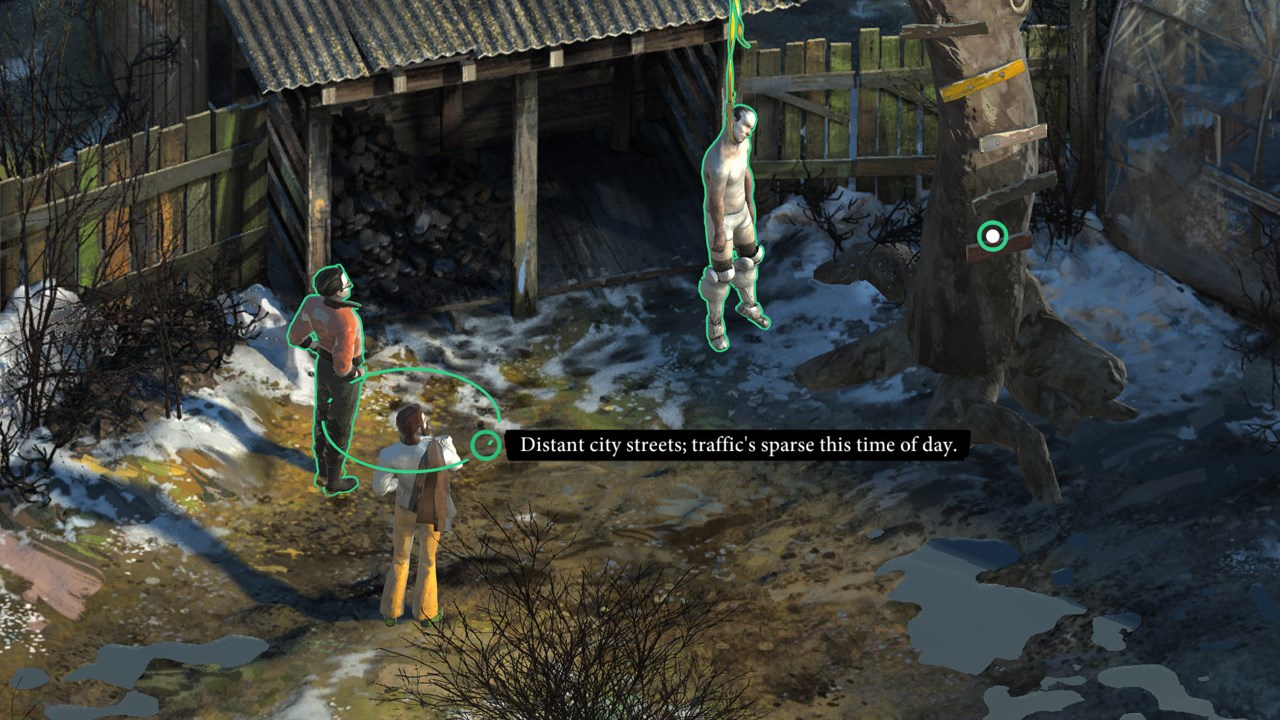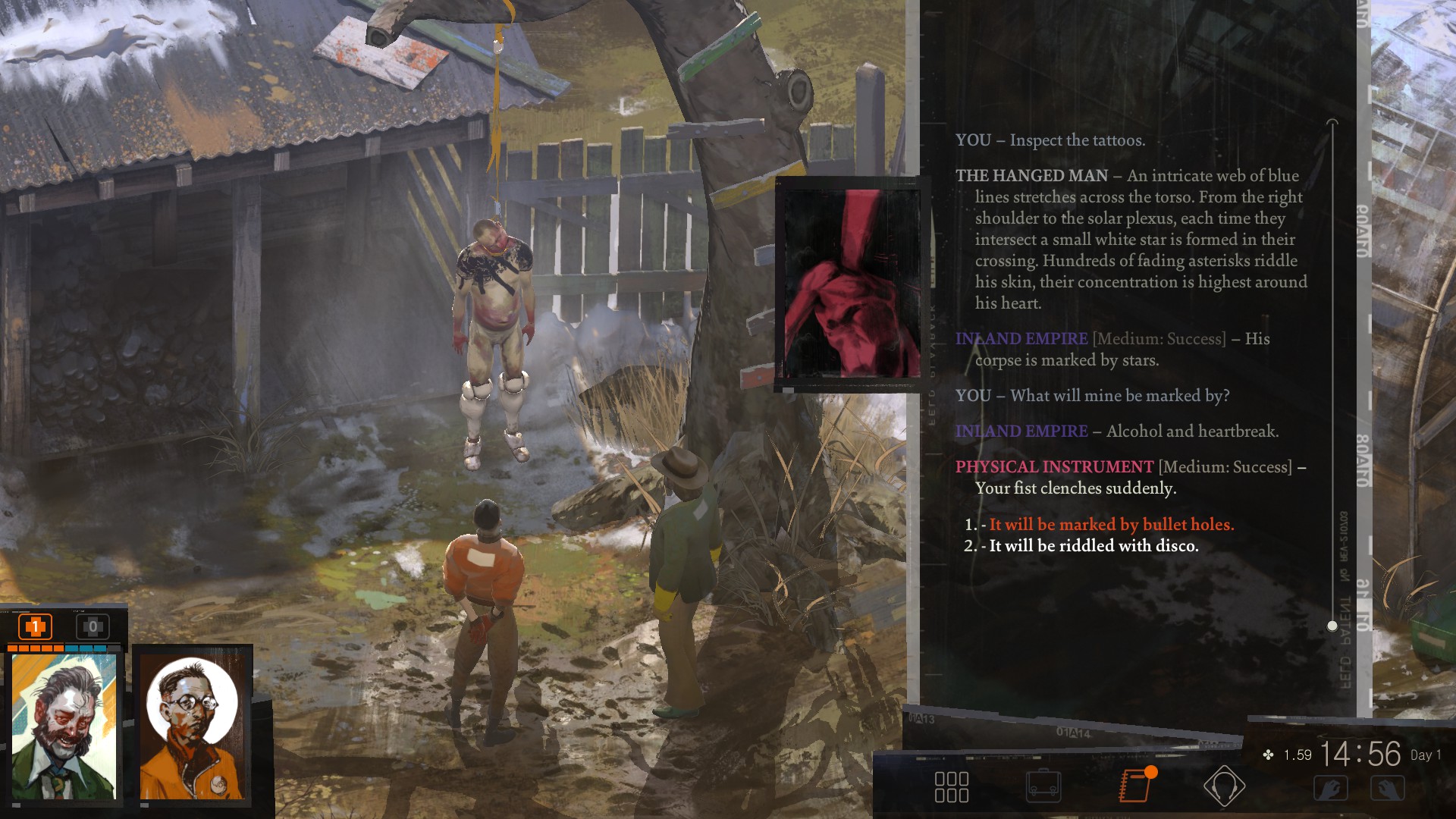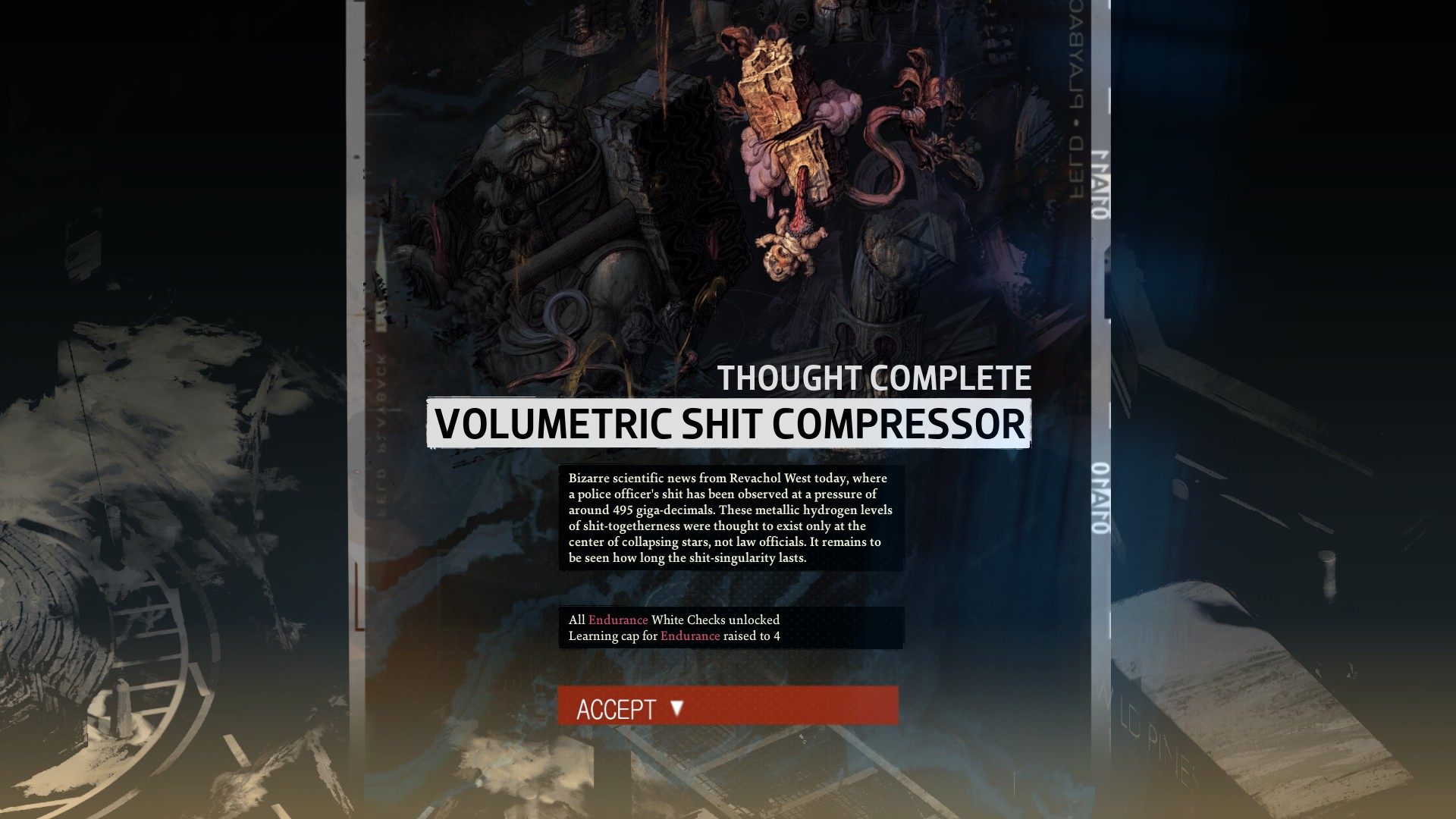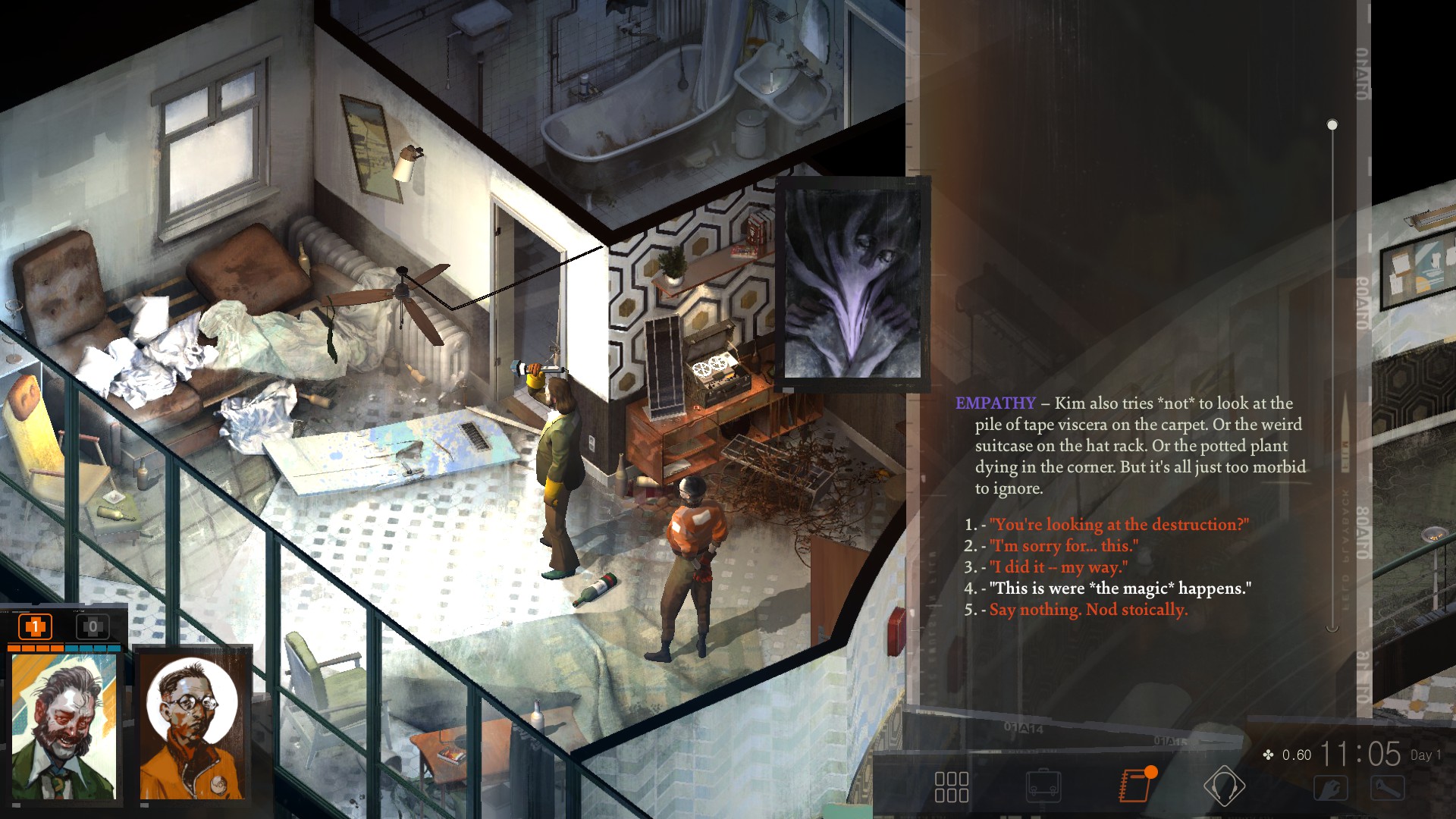Disco Elysium is my game of the year because it made me care about a lost shoe

There are limited circumstances in which it’s socially acceptable to send a colleague an all-caps email at 11:30 at night. Some sort of work emergency, perhaps. A lucrative business opportunity that requires immediate attention. Or, in the case of the brilliant, cerebral, absurdly-dense detective RPG Disco Elysium, the successful recovery of lost footwear after a three-hour search. *Bzzzzzt!* ‘I FOUND MY OTHER SHOE. Yes, you can go back to sleep now.’
Let’s give that some context. In Disco Elysium, you play as a detective recovering from the worst hangover in the history of human existence. Think of the most miserable morning after you’ve ever had, then multiply it by infinity; an elephant’s katzenjammer in an emu’s brain. As an opening, it’s a fantastic bit of scene setting. You even have to argue with your own psyche in order to wake up – a raspy internal monologue in which your brain warns you to stay asleep because returning to reality is too horrible to contemplate.

The warning makes sense once you urge your human wreckage back to consciousness. You’re met by a scene of utter devastation: you can’t remember who you are or what you do, and even getting dressed is a challenge. It’s so bad, in fact, it’s possible to die during the opening moments of Disco Elysium – actually die, until you’re 100% dead – while trying to retrieve your awful tie from a rotating ceiling fan. That’s because everything in Disco Elysium is based on dice rolls against a huge selection of personality traits. If you’re lifting a heavy weight, for instance, you roll against your physical attributes. The higher your stats, the easier the roll.
In the case of the awful tie on the ceiling fan, Disco Elysium tests your savoir faire; in other words, the ability to do the correct thing in a specific social situation. Fail the roll and you’ll take damage. And if you don’t have enough points in endurance, your heart will pop like a pork balloon, sending you shambling into the afterlife after the most ignominious death imaginable. And the game doesn’t limit itself to classic RPG abilities. Your character is constructed from skills that govern your competence as a human being, as well as some more esoteric abilities. The ‘Inland Empire’ skill, for instance, relates the power of your imagination. A high level means you can have long, revealing conversations with dead bodies and inanimate objects, including the cursed tie, which will interject with unhelpful advice at inopportune moments. I should have left you on the fan, tie.
2019’s most essential anecdote simulator

This means everything you do in Disco Elysium is governed by randomised rolls, and there are situations where it’s almost impossible to succeed. This is a good thing. It’s the looming spectre of failure that makes Disco Elysium the most entertaining and surprising game I’ve played this year. The randomised rolls and excellent writing make it impossible to predict. It’s also an industrial-strength anecdote generator. In the time it’s taken you to read this far, no fewer than 10 journalists have begun their reviews of Disco Elysium with lurid personal accounts of their in-game experiences. Probably about lost shoes.
Here’s an example: early in the game, I decide I don’t want to pay the cafe manager the money I owe him for damages, so I decide to slip away unnoticed. It’s a difficult roll against my savoir-faire skill, but not an impossible one. I fail. I fail so hard, in fact, that instead of sneaking out, I sprint for the door, jump and rotate in mid-air, flip him off with both fingers, and tell him to go eff himself. In the process, I manage to careen into an inconveniently-placed, wheelchair-bound woman and knock myself unconscious. Worst of all, it leads to another awkward internal monologue with your psyche from the start of the game. Yes, you were right, ancient lizard brain. Reality is balls.
These sort of crushing social situations are everywhere in Disco Elysium. When you first meet your partner, the efficient, straight-laced Lt. Kim Kitsuragi, your character is so damaged he can’t remember his own name. You can be honest about it, apologise, and try to move on. Or you can resist your fogged memory, roll against your conception skill, and invent a name. I try the latter, fail yet again, and surmise I’m called ‘Raphaël Ambrosius Costeau’. But it doesn’t end there. Because of that roll, I’ve decided that’s who I am. And whenever I introduce myself to an NPC I have the option to give a name that sounds like a cross between a literary detective and a decadent Italian dessert.
Weekly digests, tales from the communities you love, and more
An irresistible examination of our broken human brains

These aren’t just throwaway jokes. Disco Elysium lets you be formed by your approach to situations and, if you choose, your failures. Apologise too often for your past indiscretions and your in-game brain will stop and ask you if want to formalise things by becoming Sorry Cop – a piece of casual character analysis I find especially crushing. These internal decisions are processed in what Disco Elysium calls your Thought Cabinet, where you can internalise your feelings and turn them into character traits. Sometimes they’re the equivalent of classes – or ‘copotypes’, in Disco Elysium’s parlance – and sometimes they represent more cerebral things, such as buried memories or political allegiances. You can be anything from a spin-kicking communist disco cop to a racist art aficionado. You can even decide to be boring cop, if that’s how you choose to live your life. It’s a preposterously open-ended game.
But perhaps the best thing about Disco Elysium is these wonderful, humane failures hide a proper detective game. It almost certainly sounds ridiculous, but I was genuinely delighted when I found my other shoe. Partly because the idea of squelching around the game’s grubby setting of Revachol barefooted upsets me on an elemental level. But also because it took real detective work to find it. I miss the prompt hinting at its location early on as I’m busy trying to not be killed by my own tie. I have to retrace my steps, look for evidence of what could have happened to my lost loafer – in this case, a shoe-sized hole in a shattered window – then head out onto the balcony to find it. It’s a tiny victory, but one that neatly explains why the game is so enjoyable. It’s often rewarding enough just to get through an awkward conversation without saying something awful or accidentally knocking yourself unconscious. For such a wild, often salacious game, Disco Elysium can be surprisingly relatable. It takes the bubbling cauldron of chemicals that control your emotions when you go for a job interview, or get in a fight, or try and have a conversation with someone you slightly fancy, and breaks them down into a series of statistical tests. The results in the game are more flamboyantly awful – see the wheelchair anecdote above – but it’s a vivid, understandable look at the way our brains can betray us.



